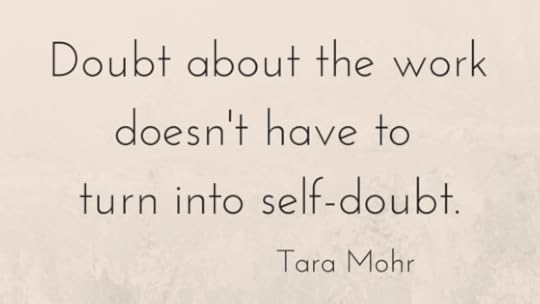on self-doubt
Earlier this week, I heard one of those things that stopped me in my tracks, and immediately made me think: That’s important. That’s helpful. I want to share that with my tribe.
I was talking with a remarkable woman who is the founder and CEO of one of the U.S.’s largest women-owned companies. She said, “I think that for anyone in any type of leadership position, if they don’t have doubts and question what they are doing, they aren’t doing a good job.”
I’d heard that kind of thing before, but this time, I heard it in a new way.
As she spoke more, I got the sense of her continually being in a space of inquiry about her company’s direction, strategic choices, and more. She was asking in an ongoing way, are we on the right path? What might we not be noticing in terms of opportunities or obstacles coming up?
But here’s what’s really captivated me: I could hear in her voice that she did all that “doubting” without a shred of self-doubt. She embraced doubt about the decisions made, the directions being pursued, the assumptions being held about the market and her customers, but didn’t think that having those doubts meant she wasn’t a capable leader.
In fact, she saw doubting as a necessary behavior for effective leaders. So if anything, it strengthened her confidence in herself as a leader.
Listening to her, I understood this: if you are awake to your work, you’ll be confronted with a lot of decisions where there is not – or not yet – a clear right answer. If you are a teacher, you’ll be doubting whether certain things about your teaching are really working, and looking for better solutions. If you are a manager, you’ll be doubting whether your approach is as empowering as it could be for your people, and exploring what could be. If you are an entrepreneur, you’ll be asking big questions about what your customers really want, and what they want at a deeper level underneath that.
But doubt about the work doesn’t have to turn into self-doubt.
The problem for so many of us is that we think that our uncertainty about whether we’re doing right, or as well as we could, means that we aren’t the right person to do the work – to create, innovate, lead, teach, write – whatever it is we are doing. We don’t tell ourselves the very empowering story that this CEO was telling herself: that the right kind of leader continually questions and doubts, looks critically, and stays open.
I picture it like two tracks that crisscross each other here and there along the way: on one, you are doing your day to day work – delivering your product or service into the world. On the other track – probably the one you move onto when you’re on a walk, or in the shower, or on a long drive home – you reflect on that work. You think on the questions about what the right strategy is, what would best serve the people you want to serve, and how to really meet the need in the world that you want to meet. Yes, you doubt, yet you also know that thoughtful consideration of what’s unclear, what’s uncertain, is simply part of doing the job well.
Love,
Tara





